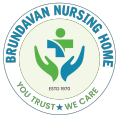Gestational Diabetes

Gestational diabetes mellitus (GDM) is a type of diabetes that develops during pregnancy. At Brundavan Nursing Home, we recognize the importance of managing gestational diabetes to ensure the health and well-being of both the mother and the baby. Our approach to gestational diabetes involves screening, diagnosis, lifestyle interventions, monitoring, and medical management to optimize outcomes for mothers and their infants.
Screening and Diagnosis: We offer routine screening for gestational diabetes as part of prenatal care. Screening typically involves an initial glucose challenge test (GCT) or glucose screening test, which measures blood sugar levels one hour after drinking a sugary solution. If the GCT results are elevated, further diagnostic testing may be recommended, such as a fasting plasma glucose test or a three-hour glucose tolerance test (GTT), to confirm the diagnosis of gestational diabetes.
Lifestyle Interventions: For women diagnosed with gestational diabetes, we emphasize the importance of lifestyle modifications to help manage blood sugar levels and reduce the risk of complications. This may include dietary counseling provided by registered dietitians, with guidance on meal planning, carbohydrate counting, portion control, and the importance of consuming a balanced diet rich in fruits, vegetables, whole grains, lean proteins, and healthy fats. We also encourage regular physical activity tailored to the individual’s fitness level and medical condition, such as walking, swimming, or prenatal yoga, to improve insulin sensitivity and promote overall health.
Blood Sugar Monitoring: We provide guidance on self-monitoring of blood sugar levels at home using a glucometer. Women with gestational diabetes are typically advised to monitor their blood sugar levels regularly, usually before and after meals, to track their response to dietary changes, physical activity, and medication therapy. Our healthcare team offers education on how to interpret blood sugar readings, recognize signs of hyperglycemia (high blood sugar) or hypoglycemia (low blood sugar), and take appropriate action as needed.
Medical Management: In some cases, lifestyle interventions alone may not be sufficient to control blood sugar levels, and medication therapy may be necessary. We work closely with obstetricians, endocrinologists, and other healthcare providers to develop individualized treatment plans based on the severity of gestational diabetes, maternal health status, and fetal well-being. Medications such as insulin or oral hypoglycemic agents may be prescribed to help regulate blood sugar levels and minimize the risk of complications.
Fetal Monitoring and Pregnancy Management: Women with gestational diabetes may require additional fetal monitoring to assess the baby’s growth and well-being. This may include regular prenatal ultrasounds to measure fetal size, assess amniotic fluid levels, and monitor for signs of macrosomia (excessive fetal growth) or other complications. Our healthcare team collaborates closely with obstetricians and perinatologists to manage the pregnancy effectively, optimize maternal-fetal outcomes, and ensure a safe delivery.
Postpartum Follow-up: Gestational diabetes typically resolves after delivery, but women who have had gestational diabetes are at increased risk of developing type 2 diabetes later in life. We provide postpartum follow-up care to monitor blood sugar levels, assess maternal health status, and provide ongoing support for lifestyle modifications and preventive measures to reduce the risk of future diabetes development. We offer counseling on breastfeeding, weight management, contraception, and family planning to support women in achieving optimal health and well-being after pregnancy.
At Brundavan Nursing Home, we are dedicated to providing comprehensive, compassionate, and evidence-based care for women with gestational diabetes. Our multidisciplinary team of healthcare professionals works collaboratively to support women throughout their pregnancy journey, promote maternal-fetal health, and empower women to make informed decisions about their health and the health of their babies.
